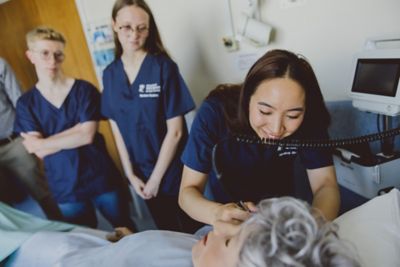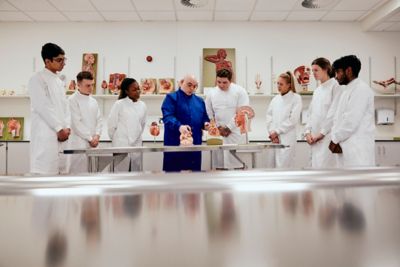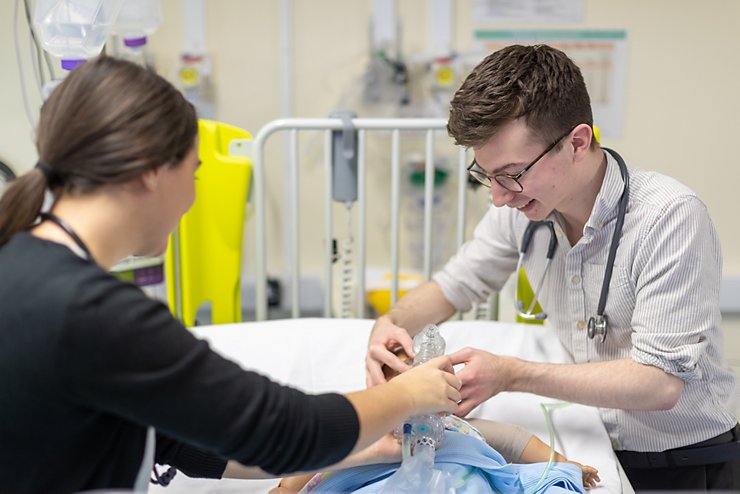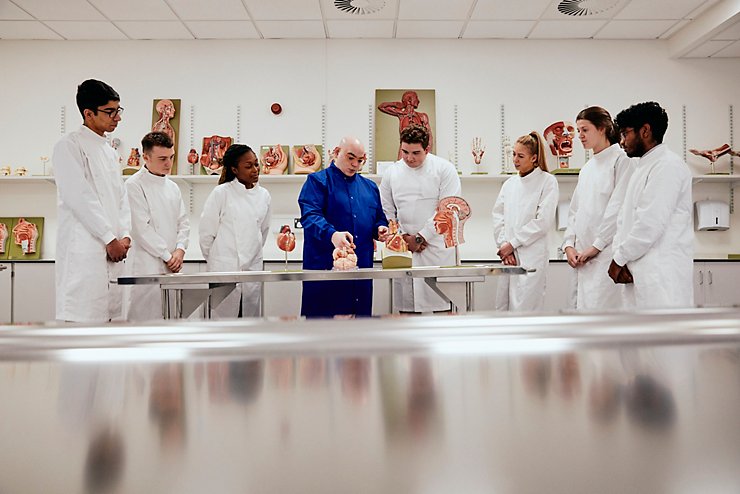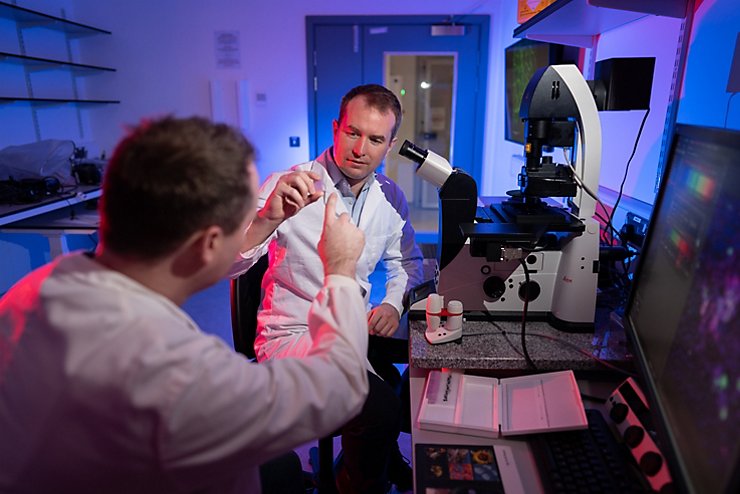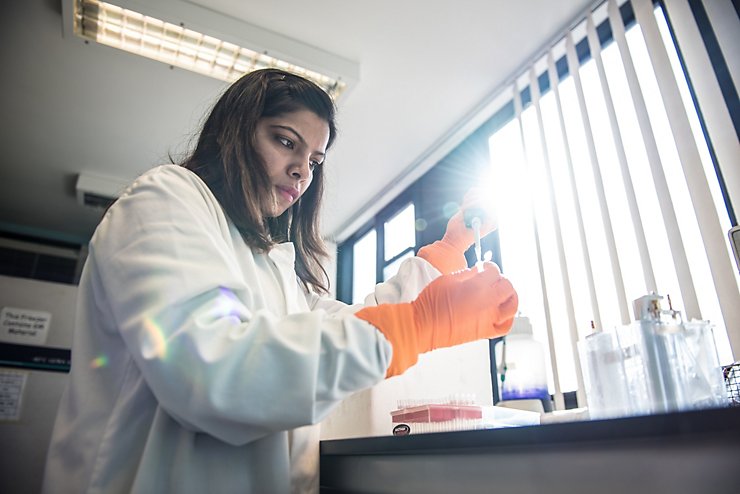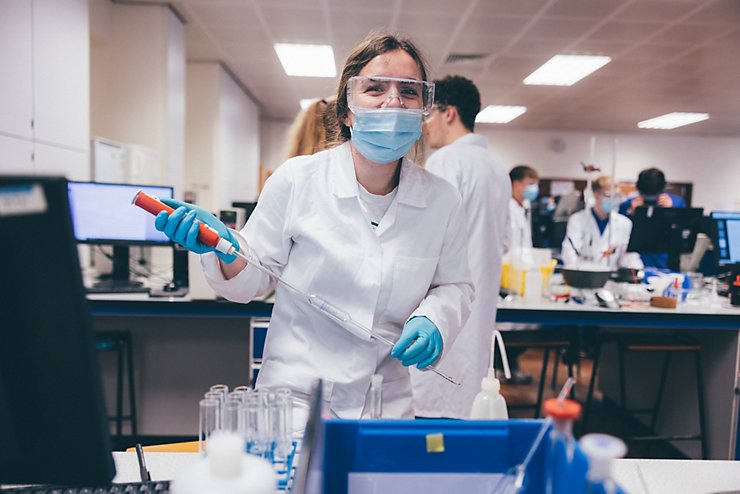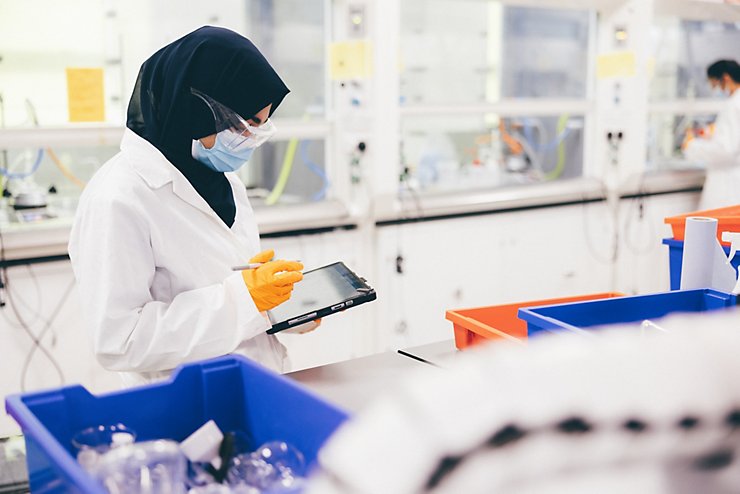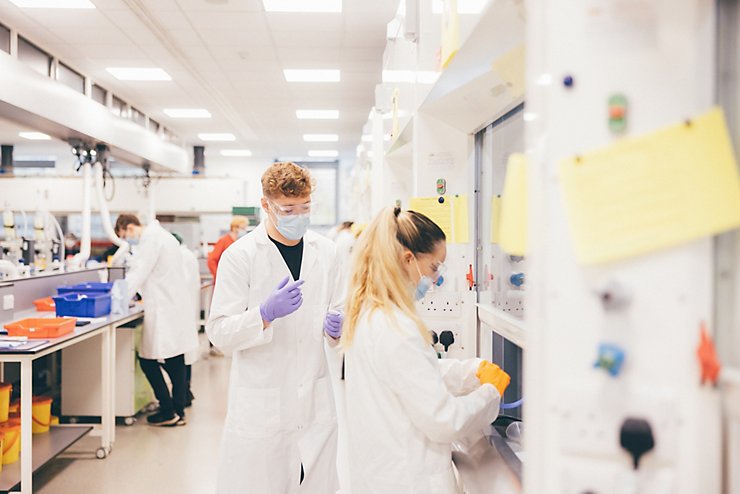- IB score
- 28
- IB requirements
28 (5, 5, 5 at Higher Level including Biology and Chemistry, excluding core component) and GCSE requirements (or equivalent)
We will accept either of the Maths qualifications for the IB at standard level (SL) or higher level (HL).
We do not score the IB and we don’t require predicted IB grades as part of the selection process. However, you will still need to achieve the IB grades required to meet your offer.
- IELTS
English language
If English is not your first language, you’ll need to have proof of your fluency in English with one of the following:
- IELTS 7.5 (no less than 7.0 in any element)
- Pearson Test of English (Academic) 79 (minimum 76)
- Cambridge Proficiency/Advanced test (from January 2015) 191 with no element below 185
- International Baccalaureate diploma: If GCSE hasn’t been taken and achieved at grade B(6) we require either IB English (standard level) at grade 6 or IB English (higher level) at grade 5
- A level
- BBC
- Required subjects
A levels
BBC: must include a B in both biology (or human biology) and chemistry
A pass is required in science practical tests, where these are assessed separately.
We do not accept citizenship studies, critical thinking, general studies, or global perspectives.
A levels need to have been studied over a two year period and that three A levels have been passed at the required grades in one sitting.
We do not accept A Level resits for this course. Please see below for full details.
Predicted A level grades, A levels, AS levels, or equivalent are not scored as part of the selection process. However, any offers made will be conditional on meeting the A level grades or equivalent required to meet the academic conditions of any offers.
Please visit our undergraduate selection process page for full details.
- Additional entry requirements
All candidates are considered on an individual basis and we accept a broad range of qualifications. The entrance requirements below apply to 2024 entry.
This course is only open to students who are living in the UK and have UK home status, indefinite leave to remain or refugee status (with a letter from the home office as evidence) at the time you make your application.
You must also meet the following criteria:
- the university's contextual admissions criteria - this means you will not receive a further reduced offer from the required A levels of BBC, or equivalent, as stated in the entrance requirements. The contextual offer has already been applied to the grade reductions and entrance requirements
- do not meet the standard or contextual entry requirements for the five-year Medicine course
- have not studied at a University
You cannot apply for both this course and the five-year (A100) Medicine BMedSci and BMBS course.
You should apply for Medicine BMedSci and BMBS (A100) course if you:
- meet the entry requirements for the five-year course
- achieve ABB at A Level, and choose to resit one or both of your B grades and then achieve all standard or contextual entry requirements for a five-year course
Additional entry requirements
All candidates are considered on an individual basis and we accept a broad range of qualifications.
This course is only open to students who are living in the UK and have UK home status, indefinite leave to remain or refugee status (with a letter from the home office as evidence) at the time you make your application.
You must also meet the following criteria:
the university's contextual admissions criteria - this means you will not receive a further reduced offer from the required A levels of BBC, or equivalent, as stated in the entrance requirements. The contextual offer has already been applied to the grade reductions and entrance requirements.
have not previously studied at a University
You cannot apply for both this course and the five-year (A100) Medicine BMedSci and BMBS course or Medicine at Lincoln BMedSci and BMBS (A10L) course.
You should apply for Medicine BMedSci and BMBS (A100) course if you:
meet the entry requirements for the five-year course
achieve ABB at A Level, and choose to resit one or both of your B grades and then achieve all standard or contextual entry requirements for a five-year course
We do not usually accept applicants who have studied Medicine before.
UK entry requirements
Minimum entry requirements
GCSEs/ UCAT
You must meet the minimum GCSE requirements and undertake the UCAT in the same year you are applying to study medicine.
Full details can be found on our undergraduate selection webpage.
Competition for places information can be found on our applying to Nottingham webpage.
If your home country is not the UK, but you moved to the UK (with indefinite leave to remain) after 1 September 2019, from an international country where you were not studying the full curriculum (i.e. all subjects) in the English language then we may accept one of the alternative qualifications.
Please contact us to find out if we accept your alternative qualification.
- Non-UK entry requirements
This course is only open to Home students.
- Work experience
Applicants are usually expected to complete regular work experience when applying for medicine. This can be:
volunteering in a care related setting
volunteering with disadvantaged groups
paid employment in a job working with the general public
Please note, we are not expecting any in person NHS work experience to have taken place.
Your application for 2025 entry will not be negatively affected if you’ve been unable to complete any in person NHS work experience.
We will be looking for knowledge of the profession and an understanding of the scope of the role of a doctor and we may ask about this during your interview.
If possible we'd advise that you speak to someone working in the NHS to ensure you are making an informed choice about your career in medicine.
We expect you to demonstrate a commitment to caring for people and a realistic idea of what working as a doctor entails.
Any students considering a gap year should use their time constructively either by working or further preparing yourself for a future career in medicine.
- A level
- BBC
- Required subjects
A levels
BBC: must include a B in both biology (or human biology) and chemistry
A pass is required in science practical tests, where these are assessed separately.
We do not accept citizenship studies, critical thinking, general studies, or global perspectives.
A levels need to have been studied over a two year period and that three A levels have been passed at the required grades in one sitting.
We do not accept A Level resits for this course. Please see below for full details.
Predicted A level grades, A levels, AS levels, or equivalent are not scored as part of the selection process. However, any offers made will be conditional on meeting the A level grades or equivalent required to meet the academic conditions of any offers.
Please visit our undergraduate selection process page for full details.
- IB score
- 28
- IB requirements
28 (5, 5, 5 at Higher Level including Biology and Chemistry, excluding core component) and GCSE requirements (or equivalent)
We will accept either of the Maths qualifications for the IB at standard level (SL) or higher level (HL).
We do not score the IB and we don’t require predicted IB grades as part of the selection process. However, you will still need to achieve the IB grades required to meet your offer.
- Additional entry requirements
All candidates are considered on an individual basis and we accept a broad range of qualifications. The entrance requirements below apply to 2024 entry.
This course is only open to students who are living in the UK and have UK home status, indefinite leave to remain or refugee status (with a letter from the home office as evidence) at the time you make your application.
You must also meet the following criteria:
- the university's contextual admissions criteria - this means you will not receive a further reduced offer from the required A levels of BBC, or equivalent, as stated in the entrance requirements. The contextual offer has already been applied to the grade reductions and entrance requirements
- do not meet the standard or contextual entry requirements for the five-year Medicine course
- have not studied at a University
You cannot apply for both this course and the five-year (A100) Medicine BMedSci and BMBS course.
You should apply for Medicine BMedSci and BMBS (A100) course if you:
- meet the entry requirements for the five-year course
- achieve ABB at A Level, and choose to resit one or both of your B grades and then achieve all standard or contextual entry requirements for a five-year course
Additional entry requirements
All candidates are considered on an individual basis and we accept a broad range of qualifications.
This course is only open to students who are living in the UK and have UK home status, indefinite leave to remain or refugee status (with a letter from the home office as evidence) at the time you make your application.
You must also meet the following criteria:
the university's contextual admissions criteria - this means you will not receive a further reduced offer from the required A levels of BBC, or equivalent, as stated in the entrance requirements. The contextual offer has already been applied to the grade reductions and entrance requirements.
have not previously studied at a University
You cannot apply for both this course and the five-year (A100) Medicine BMedSci and BMBS course or Medicine at Lincoln BMedSci and BMBS (A10L) course.
You should apply for Medicine BMedSci and BMBS (A100) course if you:
meet the entry requirements for the five-year course
achieve ABB at A Level, and choose to resit one or both of your B grades and then achieve all standard or contextual entry requirements for a five-year course
We do not usually accept applicants who have studied Medicine before.
UK entry requirements
Minimum entry requirements
GCSEs/ UCAT
You must meet the minimum GCSE requirements and undertake the UCAT in the same year you are applying to study medicine.
Full details can be found on our undergraduate selection webpage.
Competition for places information can be found on our applying to Nottingham webpage.
If your home country is not the UK, but you moved to the UK (with indefinite leave to remain) after 1 September 2019, from an international country where you were not studying the full curriculum (i.e. all subjects) in the English language then we may accept one of the alternative qualifications.
Please contact us to find out if we accept your alternative qualification.
- UK entry requirements
Offer requirements
A level offer
Predicted A level grades, A levels, AS levels, or equivalent are not scored as part of the selection process. However, any offers made will be conditional on meeting the A level grades or equivalent required to meet the academic conditions of any offers. Please visit our undergraduate selection process page to read more about our selection process.
BBC: must include a B in both biology (or human biology) and chemistry.
A pass is required in science practical tests, where these are assessed separately. We do not accept citizenship studies, critical thinking, general studies, or global perspectives.
We do not accept A Level resits for this course.
IB offer
28 (5, 5, 5 at Higher Level including Biology and Chemistry, excluding core component) and GCSE requirements (or equivalent)
We’ll accept either of the Maths qualifications for the IB at standard level (SL) or higher level (HL).
We don’t score the IB and we don’t require predicted IB grades as part of the selection process. However, you’ll still need to achieve the IB grades required to meet your offer.
Minimum entry requirements
GCSEs
A minimum of five GCSEs at Level 6 (B). This must include:
Maths and English Language
Chemistry and Biology or double science, if you haven’t taken the individual science subjects.
They need to have been studied over a two year period and that the required grades are achieved at one sitting.
We will consider one GCSE subject resit in Maths, English Language, Biology, Human Biology, Chemistry or Double Science qualifications.
The achieved overall resit grade must be a minimum of Level 6 (B) in Maths, English Language, Biology, Human Biology, Chemistry or Double Science (6,6) qualifications.
UCAT
All applicants must sit the UCAT in the same year as the application is made for the course. Applicants who achieve a UCAT SJT grade of Band 4 will not be considered for this course.
Mature Students
At the University of Nottingham, we have a valuable community of mature students and we appreciate their contribution to the wider student population. You can find lots of useful information on the mature students webpage.
Alternative qualifications
We will consider applicants who have undertaken an Access to Medicine Diploma on an individual basis:
Applicants wishing to apply with the Access to Medicine Diploma for A108 Medicine with Foundation Year for 2025 entry must achieve or have achieved
And must also meet the GCSE requirements of the A108 Course i.e.:
A minimum of five GCSEs at Level 6 (B). This must include:
Maths, English Language, Chemistry and Biology or Human Biology, or Double Science (6,6)
We will consider one GCSE Subject resit in Maths, English Language, Biology, Human Biology, Chemistry or Double Science qualifications.
The achieved overall resit grade must be a minimum of Level 6 (B) in Maths, English Language, Biology, Human Biology, Chemistry or Double Science qualifications (6,6).
Unfortunately, BTEC Nationals are not accepted for entry on to this course.
Interview
You will be required to have an interview.
Interviews may be held face to face or online using Microsoft Teams. Further details will be available.
Find out more about the Undergraduate Selection Process
Fitness to practise
We must be confident in your conduct, health and ability to be professional and interact safely with patients.
As part of your application, you'll be required to have an occupational health assessment and a disclosure and barring service (DBS) check.
We cannot accept pre-existing DBS checks. More information about this will be sent to you closer to your start date.
If we have any serious concerns we will not offer you a place, and reserve the right to revoke offers should serious concerns arise before starting the course.
Find out more about fitness to practise.
Excluded students database
When offering places to students we check the MSC Excluded Students Database as part of our commitment to professionalism and fitness to practice.
- Work experience
Applicants are usually expected to complete regular work experience when applying for medicine. This can be:
volunteering in a care related setting
volunteering with disadvantaged groups
paid employment in a job working with the general public
Please note, we are not expecting any in person NHS work experience to have taken place.
Your application for 2025 entry will not be negatively affected if you’ve been unable to complete any in person NHS work experience.
We will be looking for knowledge of the profession and an understanding of the scope of the role of a doctor and we may ask about this during your interview.
If possible we'd advise that you speak to someone working in the NHS to ensure you are making an informed choice about your career in medicine.
We expect you to demonstrate a commitment to caring for people and a realistic idea of what working as a doctor entails.
Any students considering a gap year should use their time constructively either by working or further preparing yourself for a future career in medicine.
